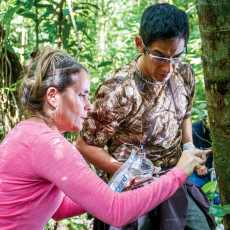- March 24, 2017
- By Chris Carroll
Don’t spit out your coffee, but there’s a fungus stalking your morning cup.
Worse, it’s targeting the livelihoods of millions of people involved in the industry worldwide. The culprit is Hemileia vastatrix, or “coffee rust,” an orange fungus that damages coffee leaves and renders plants unable to produce the seeds, more commonly known as beans, from which the beverage is brewed.
With help from a recent $2 million National Science Foundation grant, Priscila Chaverri, an associate professor in the Department of Plant Science and Landscape Architecture, is on the hunt for fungi that occur naturally in coffee plants that could be combined to fight coffee rust. She’s working with partners from Ohio State University.
“The point of our research is finding different microorganisms—in this case types of fungi called endophytes—that can be introduced into the coffee plant and grow inside of it, producing chemicals that may protect the plant from diseases and other harmful things,” she says. “It is analogous to probiotics people take to improve their immune system.”
Although ensembles of beneficial fungi haven’t yet been applied to coffee plants, Chaverri has helped isolate endophytic microbes that live inside and protect another plant that’s important to the economy of her native Costa Rica.
“Using the same approach, we found several things that can be used for diseases of the rubber tree,” she says. “So we’re confident this approach can work.”
The primary goal is to protect coffee plant seedlings as they grow, she says, but the team will also test whether the fungi can cure sickened mature plants. Although scientific literature suggesting coffee rust is reversible with such techniques is scarce, if successful, it could quickly reignite coffee production in areas where plants have stopped yielding.
Coffee rust is a worldwide disease, but Chaverri’s home region—where hundreds of thousands of jobs have been lost and many formerly productive coffee plantations have been abandoned—is always in her mind as she works.
“I’m always trying to use my research to find solutions for my region, the place I grew up,” she says. “It’s why I’ve always worked with Central and South American crops.”
